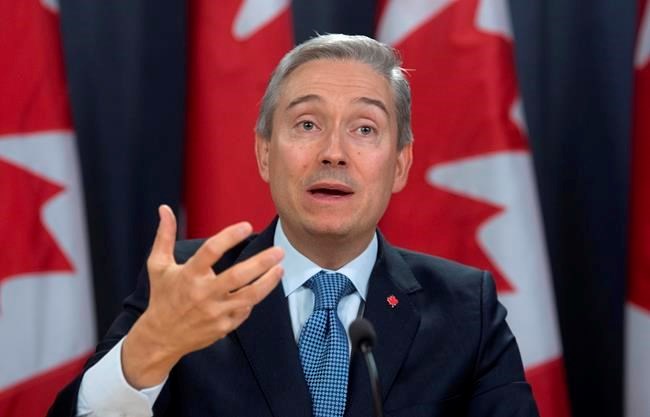OTTAWA — Canada and Britain have levelled sanctions on the president of Belarus, his son and various government officials over what they say was a fraudulent election and abuse of those who have taken to the streets to protest it.
Canada imposed the sanctions in conjunction with Britain against 11 officials in the Belarusian government, specifically targeting Alexander Lukashenko, who is facing widespread accusations of winning August’s presidential election through a rigged ballot.
According to Britain’s foreign ministry, the list of those targeted includes Lukashenko’s son Viktor, who is also his father’s national-security adviser.
Military and police commanders as well as senior officials in the Belarusian internal affairs ministry have also been targeted.
The sanctions impose a travel ban on the individuals and allow their assets to be seized. Canada used its existing sanctions regime while Britain used its newest sanctions law — named after the Russian whistleblower Sergei Magnitsky — which paves the way for alleged abusers of human rights to be directly targeted.
"The purpose of the Magnitsky sanctions is to simply say to people, ‘You've gone over the line, you've broken the rules here, and we're not prepared to pretend it's business as usual,'" Bob Rae, Canada’s ambassador to the United Nations, said in an interview.
Belarus has had wide-scale protests and violence since the Aug. 9 reelection of Lukashenko, an authoritarian leader.
Foreign Affairs Minister Francois-Philippe Champagne has called the result fraudulent and said free and fair elections must take place in Belarus.
"Canada will not stand by silently as the government of Belarus continues to commit systematic human-rights violations and shows no indication of being genuinely committed to finding a negotiated solution with opposition groups," Champagne said in a statement on Tuesday.
"Canada and the United Kingdom are acting together to ensure these sanctions have a greater impact and to demonstrate unity in our condemnation of the situation."
Britain's Foreign Secretary Dominic Raab said Lukashenko’s disdain for human rights has been evident through the torture of hundreds of peaceful protesters and the deportations and arrests of opposition figures.
"Today, the U.K. and Canada have sent a clear message by imposing sanctions against Alexander Lukashenko's violent and fraudulent regime. We don't accept the results of this rigged election," said Raab.
"We will hold those responsible for the thuggery deployed against the Belarusian people to account and we will stand up for our values of democracy and human rights."
Last week at the UN General Assembly, the foreign minister of Belarus warned Western countries not to impose sanctions.
Vladimir Makei told the virtual meeting of world leaders that interference in his country’s internal affairs would be harmful for everyone.
This report by The Canadian Press was first published Sept. 29, 2020.
Mike Blanchfield, The Canadian Press
Note to readers: This is a corrected story. A previous version said that Canada used its "Magnitsky Act" to apply the sanctions, when in fact it used the Special Economic Measures Act.




